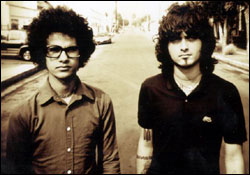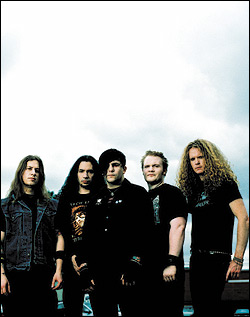CEDRIC BIXLER AND Omar Rodriguez don’t speak the same language as their contemporaries. On record, Rodriguez, svelte enough to pass for Charlie’s fourth angel, communicates in the sultry Latin phrasings of Santanaaccelerated, distorted, and obliterated like a shopworn cassette in a surly VCR. Bixler’s howl imagines childhood friend Julio Venegas’ internal struggles through a coma, recovery, and his ultimate suicidein unbreakable code phrases like “Transient jet lag/Ecto-mimed bison/This is the haunt of roulette dares.”
These two founding members of the Mars Volta and former leaders of crossover post-punk marauders At the Drive-In clearly do not know what it is to “do it all for the nookie.” Yet, those who do it for the nookie are pretty sure they speak Bixler and Rodriguez’s language, at least the part that manifests in guitar-swinging, arm-flailing, hip-shaking salsa fever onstage. These are the type of people, these bloodthirsty mosh-rock zombies from the Drive-In era, that Bixler and Rodriguez would like to avoid this time around.
“When [ATDI] played [Australian festival] Big Day Out, whatever person was grouping all the bands together put us next to Mudvayne,” Bixler sighs. “So you can imagine all the idiots that just kinda swooped over to stage left, where we were. It didn’t help that Mudvayne was like, ‘Are you guys ready to see fuckin’ At the Drive-In?!‘ We went on, we asked people to be niceof course, I was being naive and thinking we could take on the world and change things. We walked off after three songs, and everyone hated us for it, but I felt like we were doing something right. Now I look back at it as, we should’ve just shut up and played. Not everyone can be Fugazi, you know?
“People do that nowadays, too, to [the Mars Volta], but then once some other part of the song comes up that they don’t know how to dance to, they kind of get off someone’s shoulders and listen. I guess the twists and turns we take force people to be a little sedate in their approach on how they want to dance to us.”
“Twists and turns”? Talk about reductionism. This will and should sound insane, but their debut full-length, De-Loused in the Comatorium (Universal), sounds precisely how a concept album fictionalizing a man’s coma hallucinations should: A contortionist’s paradise in which Rodriguez’s fiery, unpredictable riffs are tethered by Flea’s surprisingly blunt bass lines. (“I mean, Flea used to play in Fear,” Bixler points out.) It is informed not only by the loss of Venegas, but by sound manipulator Jeremy Ward, who passed away in May. So the Mars Volta find themselves immediately cast in a pall of death, mysticism, and, even better, Universal’s bottom line.
“We didn’t want to [release a single], but that’s the way businesses are run,” Bixler grouses. “It’s not in our best interest to make just one video for a songit’s kind of like giving someone just one scene of a movie. Our A&R, being the way he is, sprung it on us. The whole radio thing was never an issue, and now it is. But, you know, [Universal] poured so much money into itand we’ve spent so much of their moneyI don’t blame them for trying to make it back a little.”
Surely, the suits’ vision of dollar signs is fallout from the Sparta sweepstakes. After ATDI split, the band’s three “non-Afros” formed the far more conventional, hard-rocking Sparta, whose buzz has since faded. Volta’s appeal is more multifaceted to execs, critics, and fans alike: The singer and lead guitarist of an already wildly influential young band reconvene to dive headlong into an ambitious epic. Bixler, unsurprisingly, laughs off the “influential” tag.
“[Sparta’s] not my cup of tea,” he shrugs. “Their music is an obvious reason why we make our music. I have no disrespect for it. We’re really kind of over that stylescreaming and a lot of stuff like that. For as much as [ATDI] claimed we wanted to branch out, we never really could, and we just kind of kept mimicking the same full-length over and over again. Relationship of Command is the same as In/Casino/Out; it’s just better production, you know? We got credit for music that people like Drive Like Jehu or Fugazi created. Because we signed on the dotted line and had our picture in magazines like NME, people think you’re the ones that started it.”
The frontman clearly doesn’t give a shit about poking sticks at the label, his fans, or his legacy. This project is about one man: Venegas.
“He is why we are the people that we are today, so this is our way of giving him a gift back,” Bixler asserts. “I don’t think anyone can judge how the album is except for him.”







